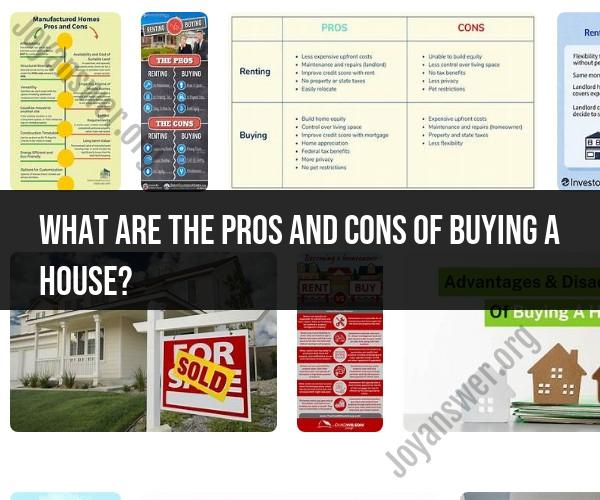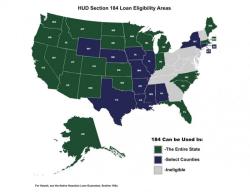What are the pros and cons of buying a house?
Buying a house is a significant financial and lifestyle decision, and it comes with both advantages and disadvantages. Here are the pros and cons of buying a house to consider:
Pros of Buying a House:
Investment and Equity:
- Appreciation: Real estate often appreciates over time, which can result in the growth of your investment. If the property's value increases, you can build equity.
Stability and Ownership:
- Stability: Homeownership can provide a stable living environment. You have control over your space and can live in it as long as you like.
- Ownership: You have ownership and control over your property, allowing for personalization and improvements.
Tax Benefits:
- Mortgage Interest Deduction: In many countries, you can deduct mortgage interest from your income taxes.
- Property Tax Deduction: Property taxes can be tax-deductible in some cases.
Sense of Community:
- Roots: Owning a home can provide a sense of belonging and community. You may establish deeper connections with neighbors and engage in local activities.
Creative Freedom:
- Personalization: You can customize and decorate your home to your liking without needing landlord approval.
Build Wealth:
- Home Equity: As you pay down your mortgage, you build home equity, which can be a valuable asset.
Rental Income:
- Investment Properties: You can buy additional properties to generate rental income.
Cons of Buying a House:
Financial Commitment:
- Upfront Costs: Buying a house involves significant upfront costs, including the down payment, closing costs, and moving expenses.
- Monthly Expenses: Mortgage payments, property taxes, insurance, and maintenance can strain your monthly budget.
Maintenance and Repairs:
- Responsibility: As a homeowner, you're responsible for maintenance and repairs, which can be costly and time-consuming.
Limited Flexibility:
- Selling Challenges: Selling a home can be time-consuming and may not always yield a profit, especially in a slow real estate market.
- Geographic Location: You're tied to a specific location, which can limit your flexibility in terms of work or lifestyle changes.
Market Fluctuations:
- Property Value: Real estate values can fluctuate, and you may not always see substantial returns on your investment.
- Economic Factors: Economic downturns can affect the real estate market and the value of your property.
Property Taxes and Insurance:
- Ongoing Costs: Property taxes and homeowner's insurance can increase over time.
Lack of Diversification:
- Concentration of Wealth: Owning a home can tie up a significant portion of your wealth in a single asset, which lacks diversification.
Risk of Homeownership:
- Foreclosure: Failing to meet mortgage obligations could lead to foreclosure.
- Unexpected Costs: Unforeseen expenses such as major repairs or natural disasters can be financially burdensome.
Time-Consuming:
- Homebuying Process: The process of buying a house can be time-consuming and involve paperwork, inspections, and negotiations.
Ultimately, whether buying a house is a wise decision depends on your financial situation, long-term goals, and personal preferences. It's essential to carefully consider these pros and cons and consult with financial advisors or real estate professionals before making this significant commitment.
Buying a House: Exploring the Pros and Cons
Buying a house is a major life decision with both pros and cons to consider.
Pros:
- Build equity. As you pay down your mortgage, you build equity in your home. This means that the value of your home increases, and you can eventually sell it for a profit.
- Tax benefits. Homeowners can deduct certain mortgage interest and property taxes from their federal income taxes.
- Stability. Homeowners are less likely to move than renters, which can provide stability for families and communities.
- Freedom and control. Homeowners have the freedom to make changes to their home as they please, without having to ask permission from a landlord.
Cons:
- High upfront costs. Buying a house requires a significant down payment, closing costs, and other upfront expenses.
- Ongoing costs. In addition to your mortgage payment, homeowners must also pay property taxes, homeowners insurance, and maintenance and repair costs.
- Less flexibility. Homeowners are less likely to be able to move quickly than renters. This can be a disadvantage if you need to relocate for work or other reasons.
- Risk of foreclosure. If you are unable to make your mortgage payments, you could lose your home to foreclosure.
Advantages of Homeownership and Building Equity
One of the biggest advantages of homeownership is the ability to build equity. Equity is the difference between the value of your home and the amount you owe on your mortgage. As you pay down your mortgage, your equity increases. This means that you have more financial security and flexibility.
Equity can also be used to leverage other financial opportunities. For example, you can use your home equity to borrow money for a home renovation, to start a business, or to pay for your child's education.
3. Challenges and Considerations When Buying a House
Buying a house is a complex process with many challenges and considerations. Here are a few things to keep in mind:
- Affordability. Make sure that you can afford the monthly mortgage payments, property taxes, homeowners insurance, and maintenance and repair costs.
- Down payment. Most lenders require a down payment of at least 20% of the purchase price of the home. However, some lenders offer down payment assistance programs.
- Pre-approval. It is important to get pre-approved for a mortgage before you start shopping for a home. This will give you an idea of how much money you can borrow and what your monthly payments will be.
- Home inspection. Once you have found a home that you are interested in, it is important to have a home inspection done. This will help you to identify any potential problems with the home.
- Closing costs. Closing costs are the fees associated with buying a home, such as appraisal fees, title insurance fees, and attorney fees.
Evaluating Your Readiness for Homeownership
Before you buy a house, it is important to evaluate your readiness for homeownership. Ask yourself the following questions:
- Can I afford the monthly mortgage payments, property taxes, homeowners insurance, and maintenance and repair costs?
- Do I have a down payment saved up?
- Am I pre-approved for a mortgage?
- Have I found a home that I love and that fits my needs and budget?
- Am I prepared for the responsibility of homeownership?
If you can answer yes to all of these questions, then you may be ready to buy a house.
Real Stories and Perspectives on the Home Buying Experience
Here are a few real stories and perspectives on the home buying experience:
- "Buying a house was the best decision we ever made. We love our home and our neighborhood. We also feel good knowing that we are building equity for our future." - Sarah J.
- "Buying a house was a stressful process, but it was worth it in the end. We had to make a lot of compromises, but we found a home that we love and that fits our needs." - John D.
- "We were hesitant to buy a house because of the high upfront costs. But we decided to go for it, and we're so glad we did. We love having our own home, and we're already seeing the benefits of building equity." - Mary S.
Buying a house is a major life decision, but it can be a rewarding one. By carefully considering the pros and cons, evaluating your readiness for homeownership, and working with a qualified real estate agent, you can increase your chances of success












